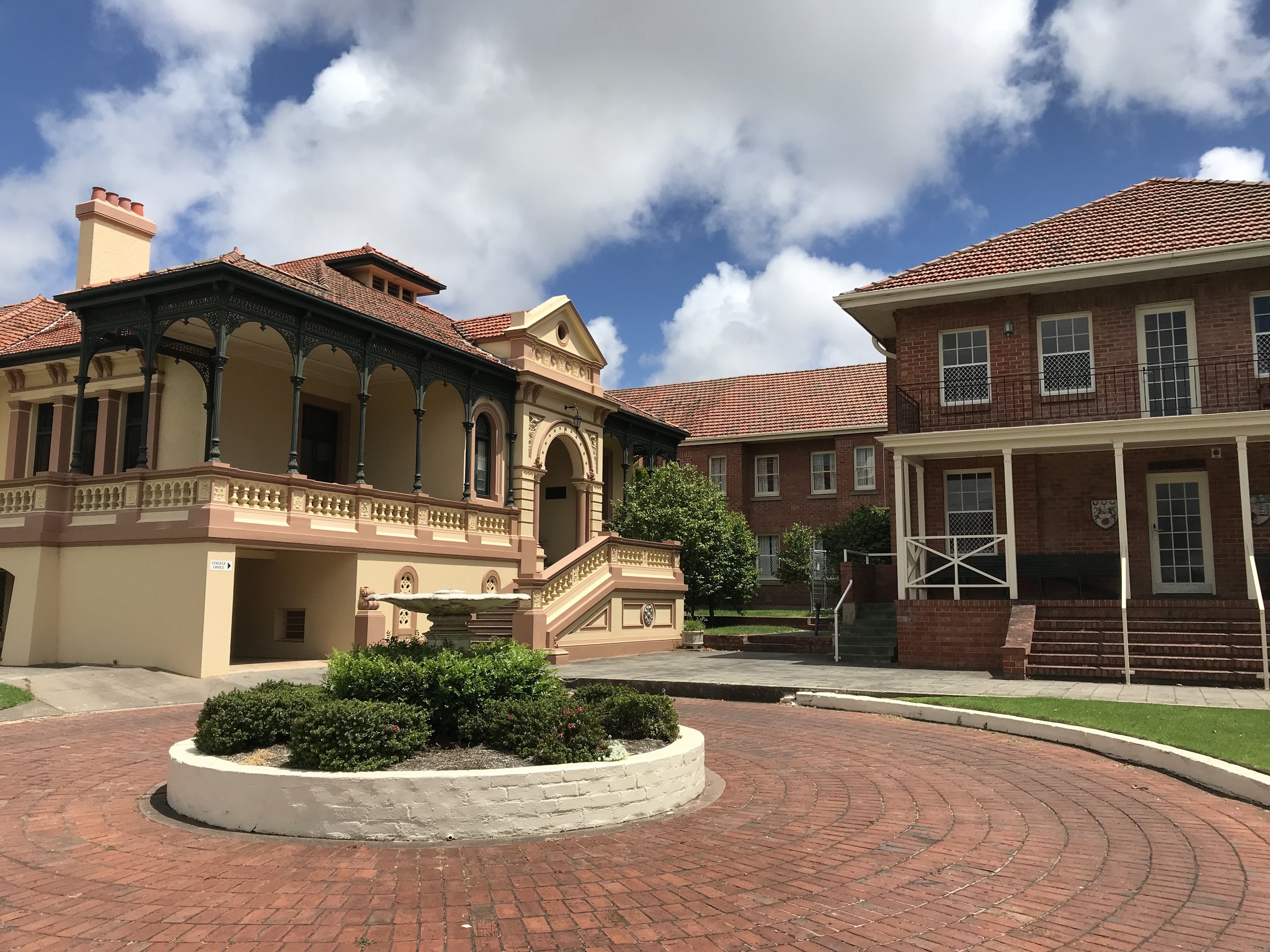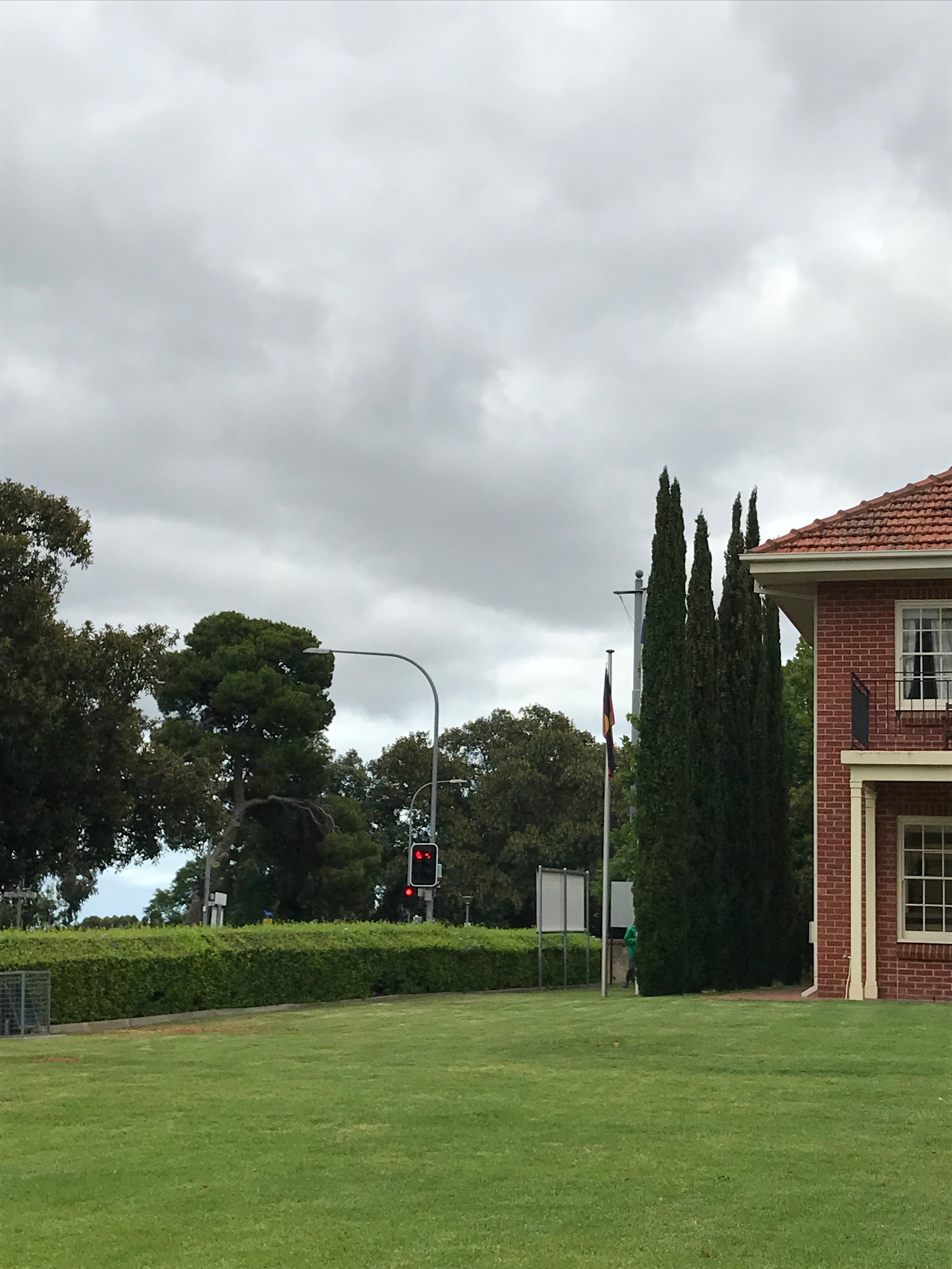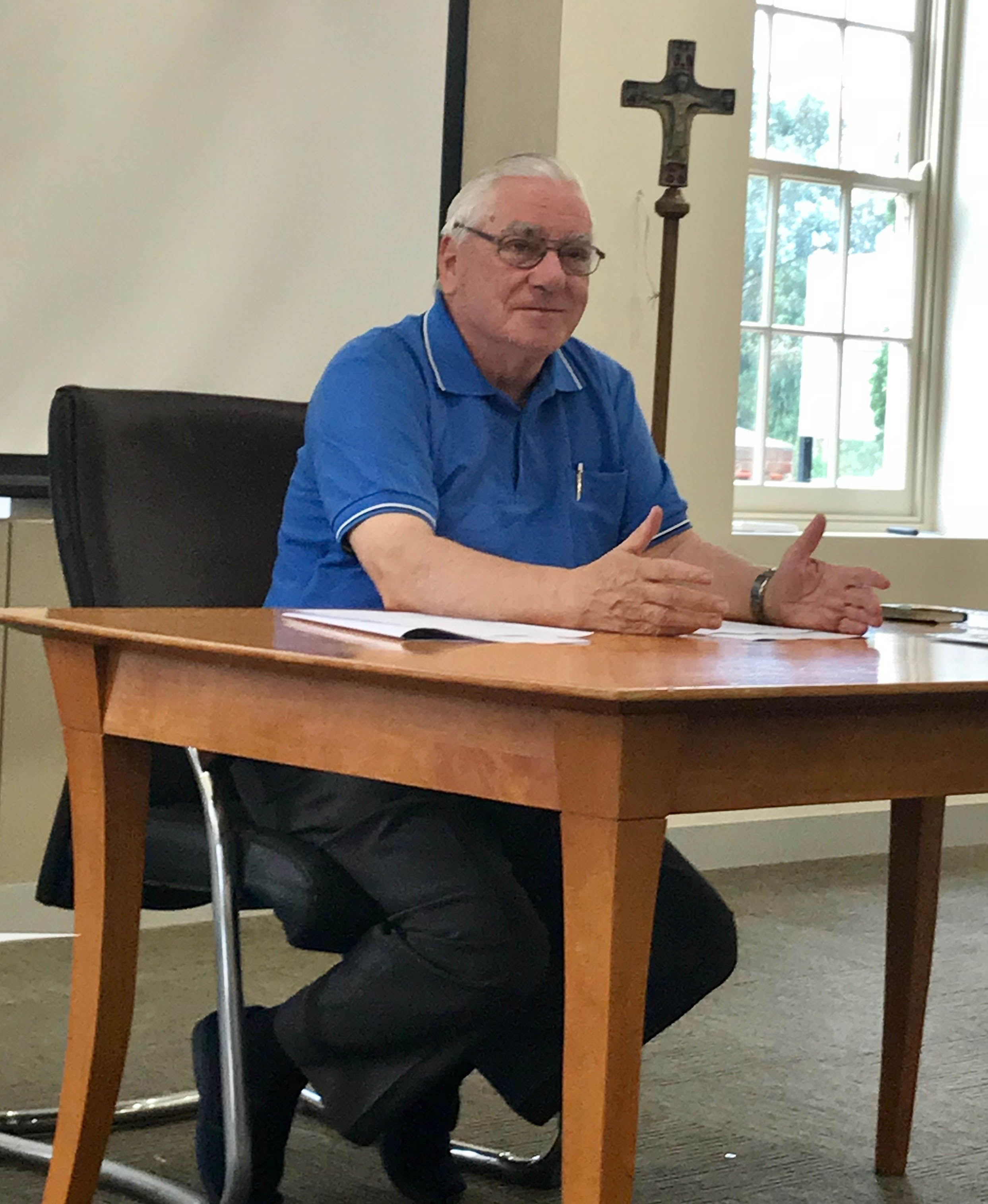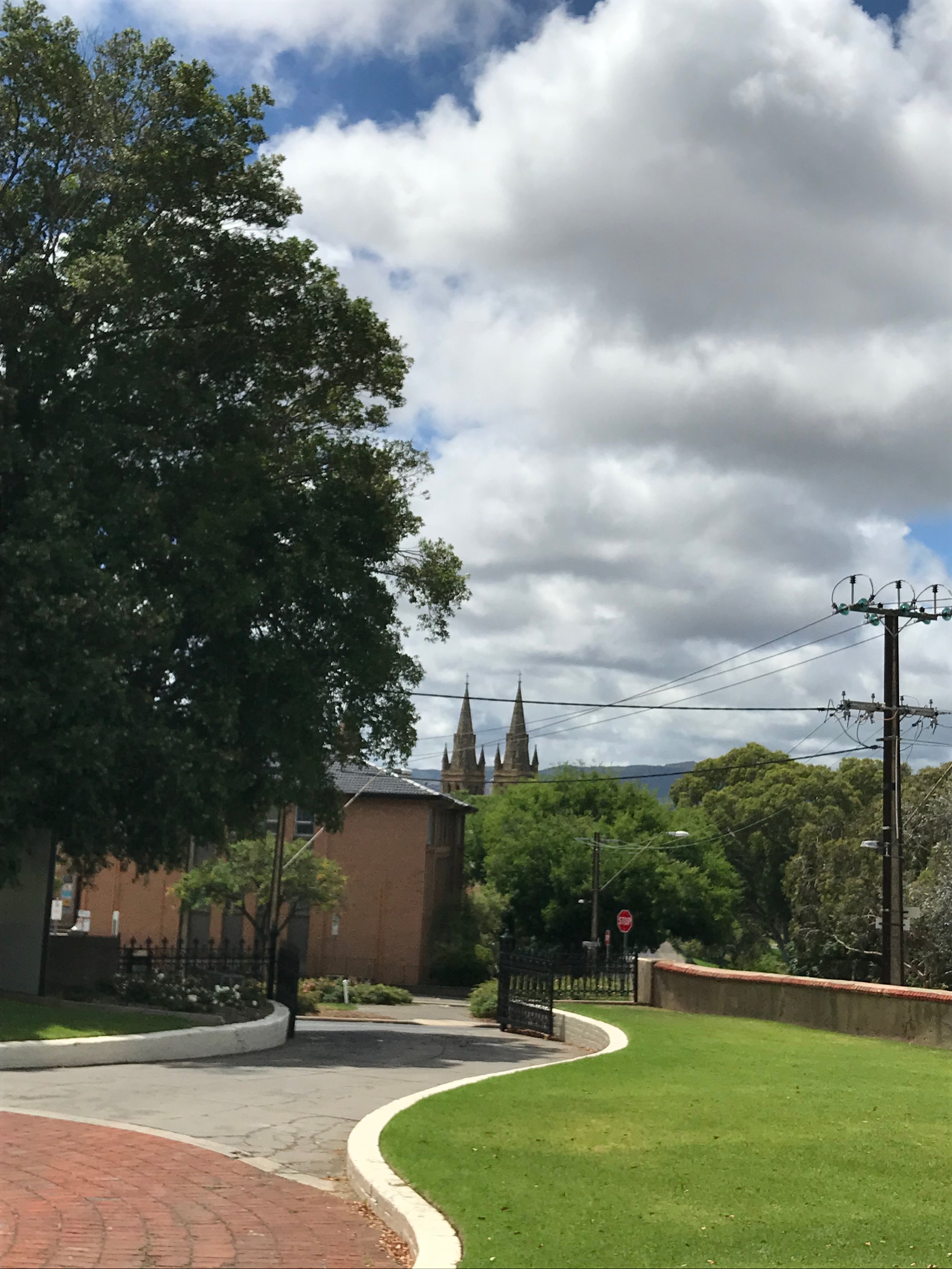Seeing God as the energy of our lives
Marists from around Australia gathered at Aquinas College, Adelaide on 27th December, 2017 with Salesian Fr Peter Varengo to begin their annual retreat. A gentle spiritual guide and educator with vast experience, Peter continues to teach with much passion.
Who are you looking for?
Peter began his first conference by inviting us to reflect on Jesus' words to Mary Magdalene after the Resurrection 'Who are you looking for? (Jn.20:15)'. Peter suggested this as a pertinent question for us at the beginning of our retreat and at this time of New Year.
The account of this event as recorded in John's gospel inspires us to try to see God in others as Mary Magdalene eventually recognised in the 'gardener'. Such 'radicality' is a common feature of the Scriptures and of our Marist constitutional documents.
In this casual encounter between two strangers, Jesus first affirms the woman and begins a conversation. He recognises she comes from Samaria and therefore feels rejected by others. Jesus doesn't focus on politically correct customs and practices, he doesn't judge her, but simply focuses on her personal needs.
Here we have a model for us Christians of how God works with us, encouraging us to see God in others, helping them in their needs and in so doing recognising the divine within them.
In due course, the story tells us the woman recognises Jesus as a 'prophet' . Jesus does not take a ritualistic approach with the woman but simply engages with her, showing her that salvation is simply 'being with God'.
We learn that our Christian faith cannot be reduced to a series of rituals or performances, it's about relationships, encounters with God, the God who is within each of us. Consequently, it is important for us to be 'out and about' engaging with people where they are, being, as Pope Francis says 'mothers not just babysitters'.
In this account of Jesus meeting Martha and Mary, we see the tension between the contemplative and the active. Both approaches are needed. We, like Jesus, want to enter into the lives of others (Mary). We also want to see that the practical responsibilities of hospitality are attended to (Martha). In Frank Wallace's words prayer is 'an encounter not a performance'. It focuses on a relationship with God not on rules or masks. The focus here is on God, not ourselves. We simply relax with Jesus.
Nevertheless, we also need structures or scaffoldings to develop our life with God, to experience the 'interior castle'. Our morning prayer time can spark the presence of God in the rest of our day. It can provide time and space to take in all that is not right and process it. It can receive what is unholy and give back what is healed and life giving. This can lead us to deep joy. Like Henri Nouwen, we stand before God 'with open hands' giving and receiving. At all times, in His encounters with others, Jesus begins with reality, as does God in the psalms.
By staying at the house of Zaccheus, Jesus is entering the core of his being, not just Zaccheus' external hospitality. There are three elements to this encounter: 1. Zaccheus takes a risk in welcoming Jesus into his house 2. Jesus is judged by others 'He has gone into a sinner's house' and 3. Jesus calls Zaccheus by name, not just by 'tax collector'. Jesus can see the human person behind Zaccheus as well as his brokenness.
In our lives we have the opportunity for similar reconciliations. We can work through dissonance. It is God who makes the first move, who takes the initiative. We simply need to take the risk of self disclosure, to come down 'from our trees', to give up control and admit our needs, including our need of reconciliation. Deep joy results.
Gerard Hughes tells us that of itself, suffering is not good but it is necessary to live life to the full. Jesus prayed that the cup be taken from Him, but only if it is the will of the Father. Salvation comes from abandoning oneself to God. The cross is only good when it is part of saying 'Yes' to the Father. It becomes the instrument by which we encounter God. In suffering we can either give up or abandon ourselves to God, adopting faith, abandonment and self giving.
Peter concluded his presentation by focusing on the parable of the vine and the branches. God wants us to bear much fruit but there may be some pruning in the process. Our earthenware jar is reshaped many times. May we recognise the pain of deep love.
Eucharist
For his sixth and final presentation, Peter focused on the Eucharist (Matthew 26:26-30/John 6:53-57). During this retreat we have been considering encounters of Jesus with various people. In his encounter with the disciples on the road to Emmaus, they recognise him when He breaks bread. Food and drink become the instruments of the revelation of God's presence beyond death.
People in Jesus' time are scandalised, they were not prepared to accept this radicality. They are used to the God of Israel being distant, a law giver and a judge. In the Eucharist Jesus says God becomes part of ourselves, the energy by which we live and grow. Thomas Keating sees the Eucharist as the ultimate vulnerability of God. We proclaim this to ourselves and each other.
Unlike the Synoptics and Paul, John does not add the comment 'do this in memory of me'. Rather, John is encouraging us to create unity with each other. The gospel involves all of us, our memories and our togetherness. It is not a private devotion. Eucharist provides us with the challenge to build community.
The first Eucharist, the last Supper, precedes Jesus dying on the cross. He does not ask us to only perform a ritual, he wants us to accept our crosses.
In Ch 13 of John's gospel, we have another unique element of his Gospel, of Jesus washing the feet of his disciples. This was unacceptable to the people of Jesus' time because it was normally the task of the last slave to arrive at the gathering. Peter, Jesus' apostle, complains because Jesus is reversing the acceptable social scale.
While John uses the same Eucharistic words as the synoptics, he sees total self giving taking the place in the formal institution of the Eucharist. We, then, are expected to wash each other's feet, becoming bread for each other. This requires our availability and joyful self giving.
Br Paul Turner recalled in the Marial prayer, which followed Peter's first talk, how author Eowyn Ivey sees her husband in her recent book To the Bright Edge of the World. She writes 'It is something I love very much about him. He goes not in search of obstacles, only the paths around them.' This exemplifies the way of Jesus' actions in helping Mary understand.
Jesus in conversation
On the second day of our retreat, Peter invited us to consider how Jesus engages with others. He takes as his first example the story of the woman at the well in John 4:3-42.
Prayer
Our retreat continued on the third day with Peter focusing again on gospel stories where Jesus encounters others. We see how he engages with them, giving us a clear example of how we might live the Christian life. This time we are considering the visit Jesus makes to the home of Martha, Mary and Lazarus, as recorded by Luke. There is a second recording of a visit Jesus makes to the same home in Bethany in John's gospel where, this time, He raises Lazarus from the dead.
In Luke's account we witness the hospitality offered to Jesus. It's obviously a meeting between friends. Peter points out the significance of the placement of this passage in Luke's Gospel after the passage on prayer. The similarities are clear. In prayer, we firstly invite the presence of God, as did Martha and Mary and then we strive to deepen our relationship with Him. Mary listens, Martha works. Mary is captured by the presence of her Friend.
Reconciliation
On our retreat's fourth day, Peter focuses on the story of Zaccheus (Luke 19:1-10) a story of dissonance. Jesus invites Zaccheus, a tax collector, to come down from the tree. Jesus sees that Zaccheus, who is not a man of faith, nor a man who wants conversion, at least wants an encounter. Zaccheus is a man who is seeking power and control, a man who happily sends families into slavery because of the taxes he charges.
Sometimes, when we have a strong sense God is entering our lives, we can feel a sense of dissonance, that something doesn't belong. If we have the courage to embrace this dissonance, Peter Verango tells us, this can lead us to a transformation, a new perception, a new reality. 'This is what the Word of God does'.
Jesus puts forgiveness before punishment. He invites us out of our self judgement and fear, into a trust in God. The Sacrament of Reconciliation can be based on fear. Fear generates dissonance. God is not after judgement, but we can be. God calls us into a conversion of heart. He encourages us to set others free in the way Jesus set Zaccheus free through entering into his dissonance.
Suffering
For his fifth presentation, Peter Verango focused on Jesus meeting the disciples on their way to Emmaus (Luke 24:13-26). Here again Jesus comes into contact with people, moves into their lives and changes them.
The disciples feel let down by Jesus' death. They want to go back to the certainty of the past. They are so wrapped up in their feelings of hurt and anger that initially they don't recognise Jesus walking with them. They tell this 'stranger' of the injustice they are facing. The stranger listens to their stories but is unmoved. He calls them 'foolish' and 'slow of heart to believe'.
Jesus shares table fellowship with all types of people. Food and drink are important elements of how Jesus encounters others. Today, the breaking of bread is the paradigm of the revelation of Jesus, as it was for the early Christians. The elements of Eucharist are memory, recognition, gathering and the sharing of food and drink. Eating food together binds people to each other. It gives energy. We become transformed into our true selves. We become divinised through the Eucharist.
John has a unique understanding of the Eucharist dedicating five chapters (one quarter of his Gospel) to the Eucharist. In this long conversation, he explains that God is oneness. John deals with the Eucharist in Ch 6 after the miracle of the loaves and fishes. This is the only miracle that occurs six times in the New Testament. John has a strong sense here of God taking over our lives.
For Augustine we cannot be Eucharist until we become broken. The Fathers of the Church spoke of becoming bread. We are invited to live eucharistically. 'Consecrated persons live eucharistically, not so much because they often celebrate the Eucharist, but because they live Eucharist and spend their life for others (Pascual Chavez).
We thank Peter for these excellent insights. They give us much to ponder.
John McMahon














